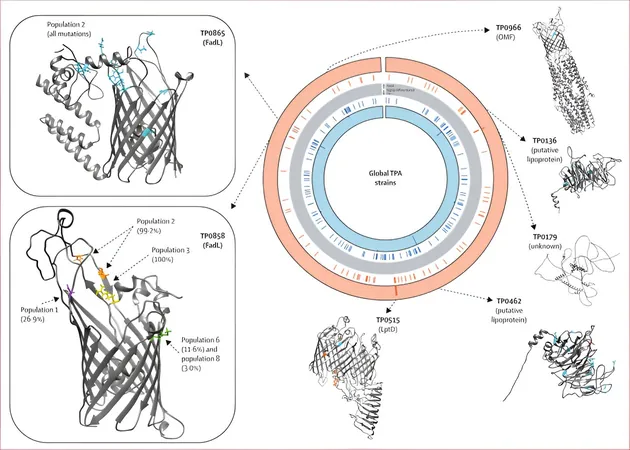
Hunting for a Syphilis Vaccine: New Genetic Insights Could Change the Game
2024-09-19
Author: John Tan
In a significant development that could reshape the fight against syphilis, a groundbreaking global study has identified promising targets for vaccine development. Amid a worrying resurgence of syphilis cases worldwide, this research highlights an urgent need to combat an age-old peril.
The Study and Its Findings
Published in The Lancet Microbe, this collaborative study spans four continents and meticulously analyzes the genetics of the syphilis-causing bacterium, Treponema pallidum subspecies pallidum (TPA). Syphilis, which surfaced in Europe around 500 years ago, has recently seen a dramatic increase in cases—over 207,000 reported in the U.S. in 2022 alone, the highest levels since the 1950s. Among these, around 3,755 cases involved infants, some of whom were stillborn, underscoring the disease's severe public health implications.
Historically, syphilis saw a decline after the introduction of penicillin in the 20th century, but changing sexual behaviors and the rise of other STIs, such as HIV, have led to its re-emergence. This has made finding effective prevention methods paramount.
Genomic Insights
A diverse team of researchers has now harnessed one of the most comprehensive genomic surveys of the syphilis bacterium to date. By correlating genetic information with clinical data from patients in countries including Colombia, China, Malawi, and the U.S., they have zeroed in on stable proteins that may serve as robust vaccine targets. Previous studies largely overlooked genetic diversity in Africa and South America, making this new data invaluable in understanding global strains of TPA.
Once collected, the samples underwent genetic sequencing at the University of North Carolina's Institute for Global Health and Infectious Diseases. Dr. Jonathan Parr, who led the analysis, emphasized the importance of whole-genome sequencing in unraveling the variants circulating around the world. He stated, “This approach enhances our comprehension of TPA strains and aids in identifying valuable targets for vaccine development.”
Implications for Vaccine Development
The researchers uncovered significant genetic variation among syphilis bacteria from different continents, yet enough similarities suggest a viable path toward creating a global vaccine. UConn School of Medicine’s Professor Justin Radolf, a senior author on the study, emphasized how modeling the bacterium's mutations could lead to crucial advancements in vaccine design.
Engaging the Community
Engaging the community is also a critical part of the process. Dr. Arlene C. Seña, co-lead of the clinical study, noted the importance of gauging public opinion and concerns regarding future vaccine trials, even at this early stage.
A Global Commitment
Funding has already been secured to propel this essential work forward, demonstrating the global health community's commitment to tackling an issue that affects millions. Juan Salazar, Physician-in-Chief at Connecticut Children’s, pointed out that this effort goes beyond local health needs and aims for a comprehensive global solution.
As public health officials scramble to curb syphilis's upward trend, this research holds the promise of not just alleviating a historical scourge but reshaping how we approach infectious disease prevention in the modern era. Will we soon see a new weapon against one of humanity's oldest foes? The answer could be just around the corner.


 Brasil (PT)
Brasil (PT)
 Canada (EN)
Canada (EN)
 Chile (ES)
Chile (ES)
 Česko (CS)
Česko (CS)
 대한민국 (KO)
대한민국 (KO)
 España (ES)
España (ES)
 France (FR)
France (FR)
 Hong Kong (EN)
Hong Kong (EN)
 Italia (IT)
Italia (IT)
 日本 (JA)
日本 (JA)
 Magyarország (HU)
Magyarország (HU)
 Norge (NO)
Norge (NO)
 Polska (PL)
Polska (PL)
 Schweiz (DE)
Schweiz (DE)
 Singapore (EN)
Singapore (EN)
 Sverige (SV)
Sverige (SV)
 Suomi (FI)
Suomi (FI)
 Türkiye (TR)
Türkiye (TR)
 الإمارات العربية المتحدة (AR)
الإمارات العربية المتحدة (AR)